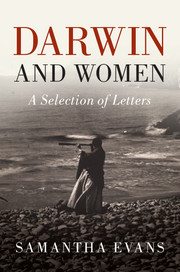Book contents
- Frontmatter
- Contents
- List of illustrations
- Foreword
- Preface
- Acknowledgments
- Symbols, abbreviations, and conventions
- 1 Friends
- 2 Marriage
- 3 Children
- 4 Scientific wives and allies
- 5 Observing plants
- 6 Companion animals
- 7 Insects and angels
- 8 Observing humans
- 9 Editors
- 10 Writers and critics
- 11 Religion
- 12 Travellers
- 13 Servants and governesses
- 14 Ascent of woman
- List of letters and provenances
- Biographical notes
- Bibliography and further reading
- Index
11 - Religion
Published online by Cambridge University Press: 16 February 2017
- Frontmatter
- Contents
- List of illustrations
- Foreword
- Preface
- Acknowledgments
- Symbols, abbreviations, and conventions
- 1 Friends
- 2 Marriage
- 3 Children
- 4 Scientific wives and allies
- 5 Observing plants
- 6 Companion animals
- 7 Insects and angels
- 8 Observing humans
- 9 Editors
- 10 Writers and critics
- 11 Religion
- 12 Travellers
- 13 Servants and governesses
- 14 Ascent of woman
- List of letters and provenances
- Biographical notes
- Bibliography and further reading
- Index
Summary
Religion was an important realm of authority for women in the Victorian period, despite their exclusion from the official hierarchies of the Anglican church and most dissenting denominations. Though widely regarded as inferior to men in intellect, women were considered equal, or even superior, in moral conduct. This assumption rested in part on their allegedly greater capacity for sympathy, and it opened leadership roles for them in areas such as philanthropy, education, and religious authorship. Depending on their wealth and social status, women might be expected to provide for the relief and improvement of the poor in the parish, or to teach in the village Sunday school. The home was also a place of religious devotion. As wives and mothers, women played a central role in the care of the household, in family prayer and the reading of Scripture, and in the moral upbringing of their children.
The Darwins and Wedgwoods were nominally Anglican. Formal adherence to Church of England doctrine was especially important for men, being an essential condition for admittance to many elite institutions, such as Oxford and Cambridge, which were important gateways to the most prestigious professions. In personal belief and practice, however, the families were Unitarian. Greater emphasis was placed on inner feeling and moral conduct than on doctrine, though belief in the afterlife remained important. The importance of prayer, Bible reading, and religious feeling are evident in letters from Darwin's sister Caroline, and his cousin and future wife, Emma Wedgwood. Tensions arising from Darwin's heterodoxy and immersion in scientific pursuits were addressed in correspondence between the couple after their engagement in November 1838. Other family letters discuss personal devotion in relation to ritual practices such as churchgoing and catechism, and provide a glimpse of Emma's moral role as educator of her children. The Darwins were active supporters of the church in Down, and on friendly terms with the local Anglican clergy, especially John Brodie Innes, who was the perpetual curate in the village from 1846 to 1868. Several years after his departure, a conflict of authority arose between the Darwins and the new vicar. Letters from Emma between 1873 and 1875 discuss this ongoing dispute, and convey her general dissatisfaction with parish affairs, and a shift of allegiance toward Protestant dissent.
- Type
- Chapter
- Information
- Darwin and WomenA Selection of Letters, pp. 166 - 182Publisher: Cambridge University PressPrint publication year: 2017



